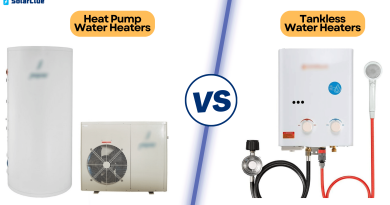Does Heat Pumps have Positive Environmental Impact?
We need to conscious about what devices we are using, as it has an environmental impact. We need to adapt such appliances which are energy-efficient. It will not only have a positive impact on the environment, but also will save a significant amount of costs.
In this blog, we will discuss about a water heating appliance known as a heat pump, and how it has a positive environmental impact. Let’s get started!
Table of Contents
What is a Heat Pump?
A heat pump is a water heating device, to meet your daily hot water needs. It is energy-efficient, as it uses less electricity than other traditional water heaters. The difference lies in the working principle. Any traditional water heater, like a geyser, uses direct electricity to heat water. Whereas, a heat pump uses electricity to only transfer heat from one place to another. This heat is used to produce hot water, rather than electricity.
How Does a Heat Pump System Works?
A heat pump works on the principle of transferring heat from one place to another.
This system consists of two main components: an indoor unit and an outdoor unit.
The outdoor unit has two parts – an exhaust fan and a compressor. The indoor unit is the storage tank, where water is stored.
The exhaust fan absorbs heat from the surrounding air, while the compressor compresses the refrigerant gas, increasing its temperature. This heated refrigerant gas then passes through a spiral condenser inside the indoor unit, transferring its heat to the water stored in the tank. This process continues until the desired water temperature is reached.
Unlike traditional geysers that use a significant amount of electricity to generate heat, heat pumps consume less energy by simply moving heat from one place to another. This makes them more energy-efficient and cost-effective in the long run.
How Do Heat Pumps Contribute Towards a Positive Environmental Impact?

India is currently facing severe environmental issues, and it has a lot to do with our household appliance. Installing a heat pump would help us to reduce such serious issues, which will be beneficial for our planet and human health. The issues that heat pumps reduce are as follows:
1. Climate Change Prevention
Climate change refers to the long-term shift in global weather patterns, primarily caused by human activities that release greenhouse gases into the atmosphere. Heat pumps play a crucial role in preventing climate change. They do operate using electricity, but it is used only to absorb the heat and transfer it from one place to another. This process requires significantly less amount of electricity, compared to heating water using direct electricity. This means the burning of fossil fuels decreases, so the emission of greenhouse gases like carbon dioxide also decreases. By reducing our reliance on fossil fuels, heat pumps help curb the release of these harmful gases that trap heat in the atmosphere and drive climate change.
2. Reducing Greenhouse Gas Emissions
3. Reducing Air Pollution
Air pollution refers to the release of harmful substances like particulate matter, nitrogen oxides, and sulfur dioxide into the air we breathe. These pollutants can have serious impacts on human health and the environment. Traditional water heaters require huge amount of electricity to run efficiently. This leads to burning of fossil fuels, which releases harmful pollutants. Heat pumps use electricity only to transfer heat. This process requires less electricity consumption, which means lower level of burning of fossil fuels. This leads to a reduction in air pollution.
4. Sustainable Development
Sustainable development aims to meet our current needs without compromising the ability of future generations to meet their own needs. Heat pumps promote sustainability by reducing our reliance on finite fossil fuel resources. They do run on electricity, but its requirement is significantly less. This allows us to heat water efficiently while minimizing damage to the environment.
5. Reducing Global Warming
Global warming is the ongoing rise in the Earth’s average temperature, largely driven by human emissions of greenhouse gases. By reducing the burning of fossil fuels, heat pumps significantly cut these emissions. Less greenhouse gas emissions mean less heat gets trapped in the atmosphere, helping slow the alarming rate of global temperature rise. Switching to efficient heat pump technology is an important step in the global effort to reduce global warming.
What are the other Benefits of Heat Pump Water Heaters?
In addition to their positive environmental impact, heat pump water heaters offer several other benefits:
1. Cost-Effective
Heat pumps have high upfront cost. However, they make up for it through lower operating costs. Heat pumps transfer heat rather than generating it directly. This uses far less electricity – up to 75% less. Over its 10-15 year lifespan, a heat pump can save you hundreds or even thousands in energy costs. So it is actually a cheaper alternative to other traditional water heaters like geysers.
2. Long Lifespan
With proper maintenance, heat pumps last 15 years or more – significantly longer than standard electric geysers (8-10 years). So there is no need for replacement for a long time. This extended life cycle also contributes to it being a cost-effective option.
3. Reduced Water Wastage
Traditional water heaters constantly heat and reheat the same water, leading to significant energy losses. Heat pumps heat water more efficiently, so you don’t have to run the tap as long waiting for hot water. This conserves water, especially in households with long pipe runs.
4. Efficient in Cold Climates
One common misconception about heat pump water heaters is that they may not perform well in colder climates. However, modern heat pump water heaters are designed to be efficient even in low temperatures. They can effectively extract heat from the surrounding air, even when the temperature drops below freezing. This makes heat pump water heaters a viable and energy-efficient option for hot water needs in various climates, including colder regions.
5. Manual Temperature Setting
Most heat pumps allow you to change temperature as per your requirements. This ensures you have hot water when needed without wasting energy by overheating the water beyond your requirements.
6. Availability in Different Sizes
Heat Pumps normally have an indoor and an outdoor unit. But many homes in India, specially in big cities, may not have that space available. For that, a single-unit heat hump is designed. It is also called Integrated Heat Pump.
Conclusion
As we strive to create a more sustainable future, heat pumps emerge as a game-changing solution, offering a powerful combination of energy efficiency, cost-effectiveness, and a positive environmental impact. By embracing this renewable energy technology, we not only contribute to the prevention of climate change and the reduction of greenhouse gas emissions but also pave the way for a cleaner and more sustainable tomorrow. Investing in heat pumps is an investment in our planet’s future, ensuring that we leave behind a greener and more habitable world for generations to come.
Visit SolarClue® to see the best heat pump water heaters. SolarClue® is an online marketplace where solar energy products are sold at discounts up to 50%.




